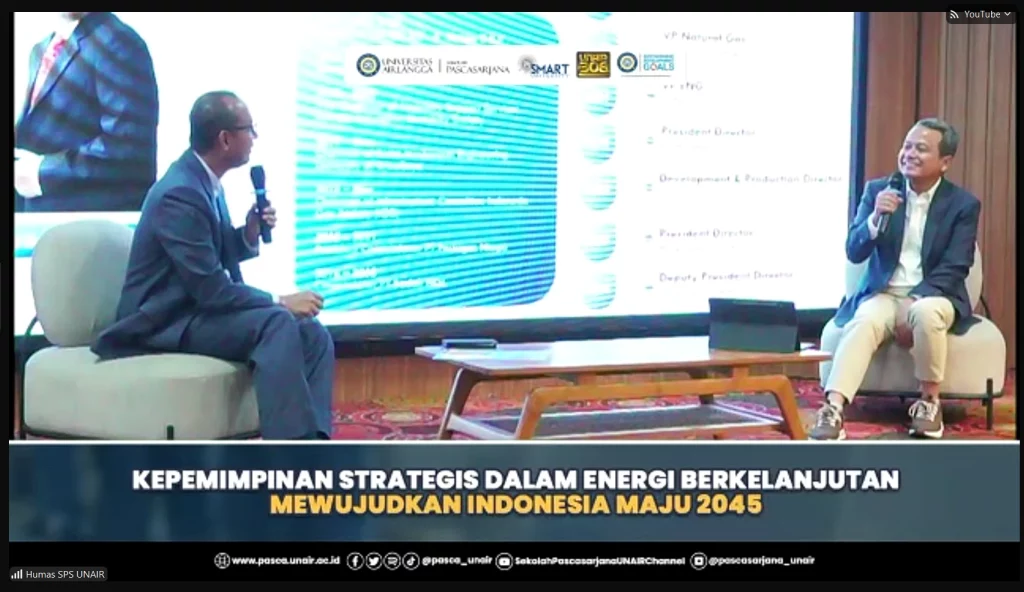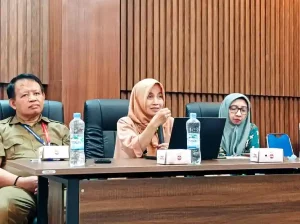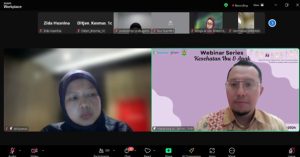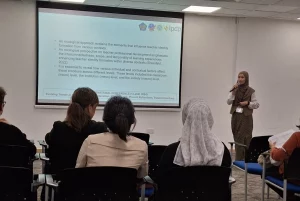UNAIR NEWS – Sustainable energy is a critical issue amidst global challenges such as climate change and geopolitical tensions affecting the energy industry. Acknowledging these challenges, Universitas Airlangga’s (UNAIR) Postgraduate School hosted a guest lecture titled Strategic Leadership in Sustainable Energy for Realizing Advanced Indonesia 2045. The hybrid event took place on Friday, December 6, 2024, at the Majapahit Room, ASEEC Tower UNAIR, and via Zoom. The keynote speaker was Wiko Migantoro, Deputy Director of PT Pertamina (Persero).
In his opening remarks, Prof. Badri Munir Sukoco, SE, MBA, PhD, Director of UNAIR Postgraduate School, underscored the vital role of energy in national development. “National resilience can only be achieved through energy independence. With the pentahelix concept, Indonesia has a significant opportunity to establish energy self-sufficiency and sustainability,” he stated.
Transforming Strategic Leadership
Wiko highlighted the need for transformative leadership in the energy sector, calling for a shift from a profit-focused approach to one that prioritizes broader societal and environmental impacts. “Future leaders must possess a broad vision that integrates economic growth with environmental sustainability,” he explained.
He outlined several strategic approaches critical for energy sector leaders, including Multi-Level System Thinking, which views the energy sector as a complex system encompassing technology, economics, and social factors. Additionally, he emphasized Stakeholder Inclusion, advocating for collaborative efforts across regulators, businesses, and consumers.
“Moreover, Disruptive Innovation, which involves leveraging renewable energy technologies and digitalization, is a key driver for new growth in the energy industry. Lastly, Long-Term Activation stresses the importance of managing energy resources with a forward-looking vision to ensure sustainability for future generations,” Wiko explained.
Strategies for sustainable energy
Wiko elaborated on Pertamina’s dual growth strategy, which focuses on enhancing national energy resilience while expanding low-carbon business initiatives. This strategy is vital in addressing Indonesia’s energy challenges and aligning with the government’s vision for energy self-sufficiency. “Strengthening upstream oil and gas production and refinery capacities presents significant opportunities, especially through potential gas ventures and infrastructure development,” he said.
Pertamina has also emphasized geothermal energy as a key element in advancing the green economy. According to Wiko, geothermal energy not only supports renewable energy development but also has the potential to boost the national economy.
“Indonesia possesses the world’s second-largest geothermal reserves, with a capacity of 24 GWe. Geothermal is the most promising renewable energy source to serve as a base load and reduce fuel imports. Achieving this vision requires cross-sector collaboration under the pentahelix framework, involving government, businesses, communities, media, and academia,” Wiko concluded.
Author: Hana Mufidatuz Zuhrah
Editor: Edwin Fatahuddin









